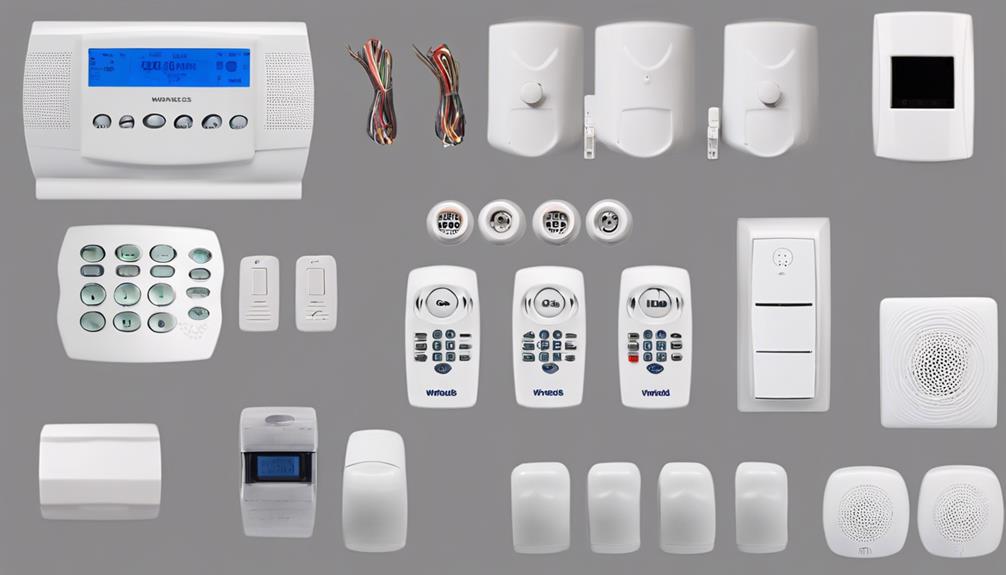When choosing between wired and wireless home alarm systems, consider your priorities. Wired systems offer a stable connection less affected by interference, perfect for consistent monitoring. Wireless setups, though easy to install, might face disruptions from electromagnetic interference. Wired alarms are traditionally more secure against hacking, while wireless ones rely on internet connectivity. Wired systems with local storage can save on monthly cloud expenses. So, think about what matters most: reliability, installation ease, or network security. Your decision hinges on understanding how each system suits your unique security requirements.
Key Takeaways
- Wired systems offer stable connections with less interference.
- Wireless systems are susceptible to disruptions from electromagnetic interference.
- Wired systems ensure surveillance during internet outages.
- Wireless systems may incur ongoing costs for cloud storage.
- Wired systems generally have lower long-term expenses.
Connection Stability
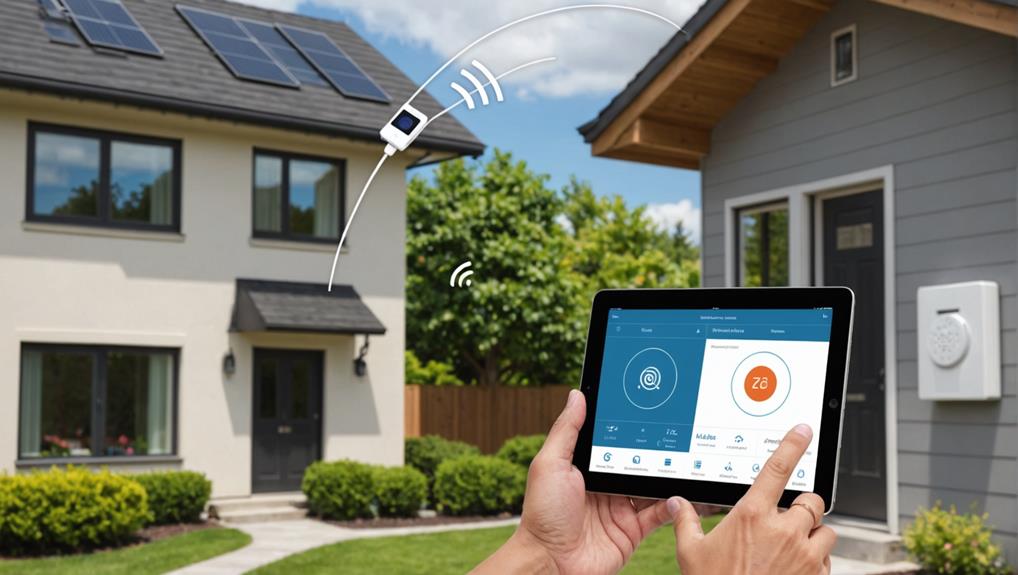
When it comes to connection stability in home alarm systems, wired setups offer a robust and reliable solution. Wired alarm systems provide a secure connection that isn't easily affected by interference from household appliances, ensuring consistent monitoring and timely alerts.
This stability is a significant advantage over wireless alarm systems, which can experience disruptions due to electromagnetic interference from devices like microwaves, potentially leading to connectivity issues. According to comparative analysis of wireless and wired security systems for residential properties, wired connections are generally more reliable in maintaining consistent performance.
The reliability of wired connections enhances the overall effectiveness of security measures as they're less susceptible to environmental factors that could impact performance.
In contrast, wireless systems, particularly cameras, may face challenges during periods of high interference, compromising their functionality and reliability. Additionally, wired systems continue to operate seamlessly even if there are internet connectivity issues, ensuring continuous surveillance and reliable data recording.
Consequently, for those seeking a dependable and stable connection for their home alarm system, wired setups present a practical and effective solution.
Network Security
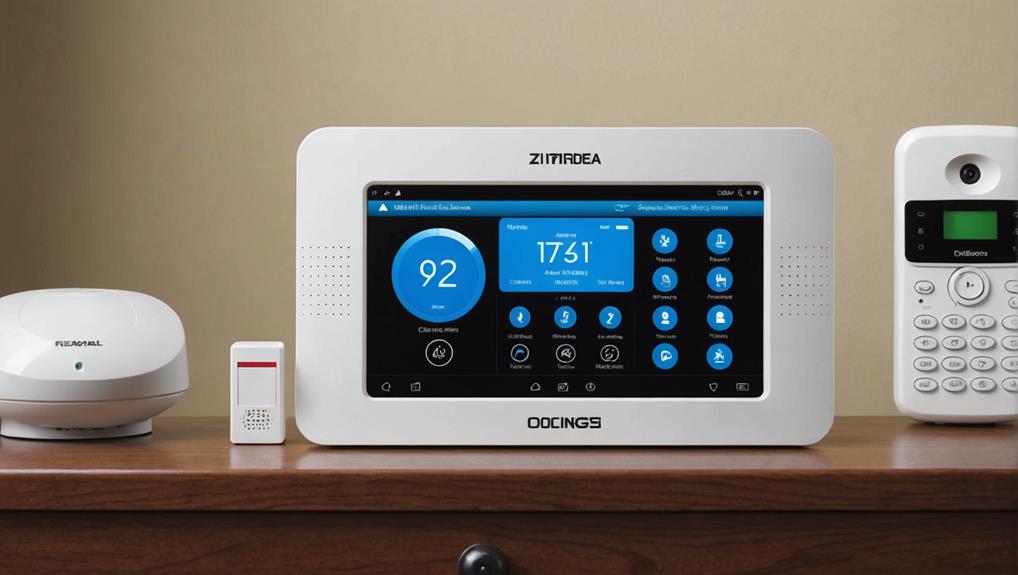
Enhancing network security is an essential aspect of choosing the right home alarm system for your property. When comparing wired vs. wireless alarms, it's important to evaluate the level of protection each option offers. Here's a breakdown of how each system fares regarding network security:
| Aspect | Wired Alarms | Wireless Alarms |
|---|---|---|
| Vulnerability to Hacking | Less vulnerable due to physical access requirements | More susceptible to interception and unauthorized access |
| Dependence on Internet | Operates independently from external networks | Higher exposure to cyber threats due to internet reliance |
| Data Storage | Local storage reduces risk of data breaches | Relies on cloud services, increasing potential security risks |
When it comes to network security, wired home alarm systems have the upper hand due to their physical security measures and independence from external networks. However, wireless systems can still be secure with the implementation of strong encryption and secure passwords. Weigh these factors carefully when making your home security decisions.
Costly Cloud Storage Options
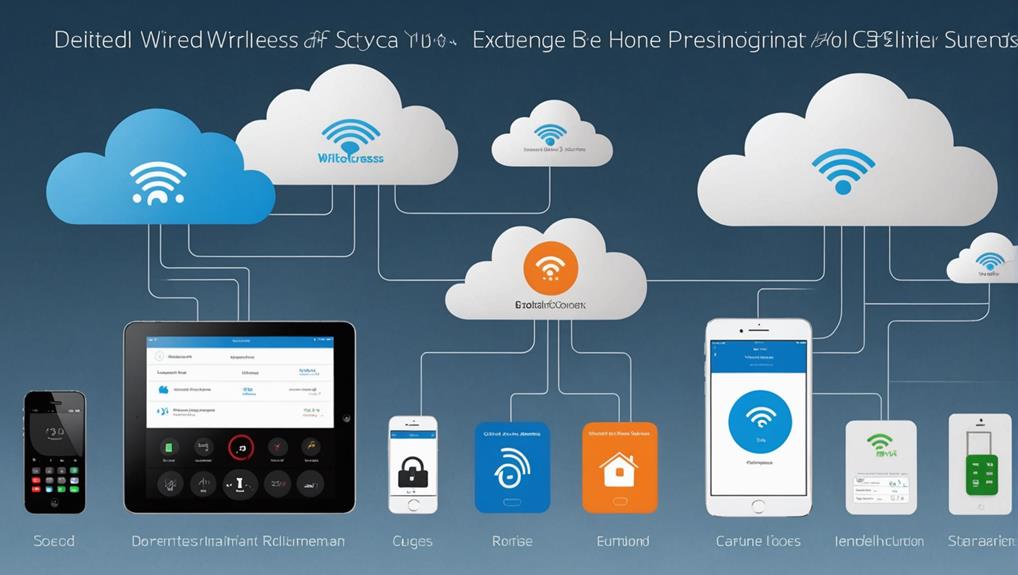
Considering the cost implications of your home alarm system is essential when evaluating wired versus wireless options.
Alarm installation can come with additional expenses, particularly when it comes to cloud storage options. Wireless systems often require costly monthly subscriptions for cloud storage to save recorded footage. These fees can accumulate considerably over time, impacting your overall expenses.
Ongoing costs such as equipment updates, repairs, and monitoring fees can also add to the financial burden. In contrast, wired systems typically store footage locally, eliminating the need for recurring cloud fees and reducing long-term costs.
With wired systems, you can access recorded footage immediately without relying on internet connectivity, enhancing convenience and security. Additionally, the absence of cloud storage in wired systems minimizes exposure to data breaches associated with third-party services, safeguarding your privacy.
When considering the financial aspect of alarm installation, opting for a wired system with local storage may offer a more cost-effective solution in the long run.
Dependence on Internet Connectivity
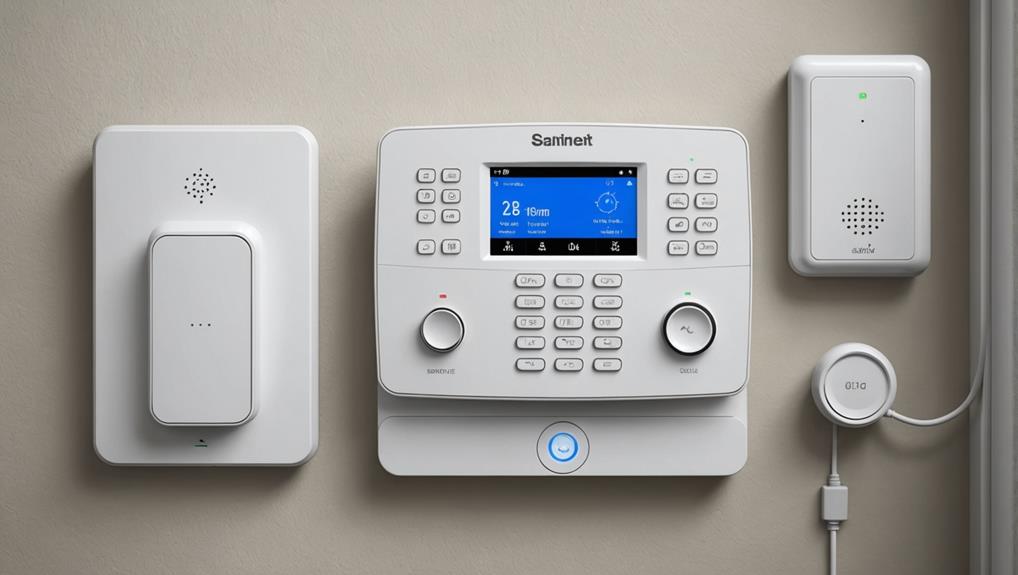
With wireless home alarm systems relying on internet connectivity, any outage can lead to a halt in recording and operational functions. This dependency raises concerns about data storage, as wireless systems often rely on cloud-based services, risking potential data loss during internet disruptions.
Additionally, wireless systems may face issues with signal interference from other electronic devices, which can affect their reliability.
In contrast, wired systems provide consistent monitoring capabilities regardless of internet status and store footage locally, ensuring security effectiveness even during connectivity issues.
Internet Outage Impact
During internet outages, the reliance of wireless home alarm systems on internet connectivity becomes a critical factor that can impact their functionality.
Unlike wired systems that operate independently of internet access, wireless systems may cease recording and fail to send alerts when the internet is down. This dependency on internet connectivity also means that wireless systems relying on cloud storage for footage face the risk of data loss during interruptions in service, whereas wired systems store footage locally, ensuring data retention.
Additionally, weak Wi-Fi signals can compromise the performance of wireless systems, rendering them less reliable during peak usage times or network congestion.
The susceptibility of wireless systems to potential vulnerabilities, such as cyber threats or outages, due to their dependence on internet connectivity highlights the importance of considering these factors when choosing between wired and wireless home alarm systems.
Data Storage Concerns
Amid growing concerns about data storage capabilities, the reliance of wireless home alarm systems on internet connectivity emerges as a critical factor impacting their performance.
Wireless systems depend on internet connectivity for data storage and access, which can lead to interruptions in recording and limited remote access if the internet goes down.
In contrast, wired systems store data locally, allowing continuous recording even during internet outages.
Cloud-based storage for wireless systems often requires monthly subscriptions, resulting in ongoing costs, while wired systems can avoid these fees by using local storage solutions.
Wired systems also offer superior video quality, unaffected by internet bandwidth limitations, ensuring high-resolution recordings are consistently available.
The risk of data loss is higher with wireless systems during internet disruptions, as footage may be compressed or inaccessible, whereas wired systems maintain reliable access to recorded data.
Ease of Installation
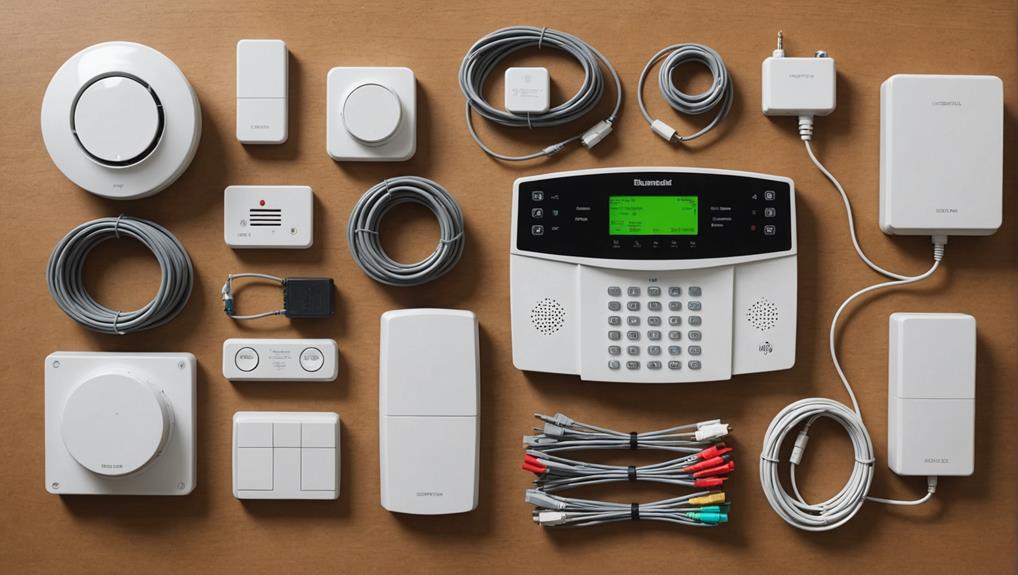
Setting up a home alarm system can be a crucial step in ensuring your security and peace of mind. When it comes to ease of installation, wireless systems have a clear advantage over wired ones.
With wireless systems, you can often complete the setup in under an hour without the need for professional help. This simplicity is due to the lack of cables that need to be run through walls, which is a common requirement for wired systems. The absence of drilling and cutting into walls also makes wireless systems a more attractive option for renters or those who prioritize the aesthetics of their home.
Additionally, overcoming common issues associated with wireless systems, such as signal interference, is generally straightforward.
While some wired systems use Power over Ethernet (PoE) technology to simplify wiring, they still tend to be more labor-intensive to install and may require professional assistance, increasing overall costs.
However, once installed, wired systems generally have lower maintenance needs compared to wireless systems, which require regular battery checks and replacements.
Hybrid Security Systems

Hybrid security systems offer a blend of wired and wireless components, providing a versatile solution for your home security needs.
With the ability to integrate both types of technology, you can enjoy the reliability of wired connections and the flexibility of wireless devices.
This versatility allows homeowners to choose the best security system based on their specific requirements, budget, and personal preferences.
Consider compatibility factors and technology options when exploring hybrid systems to guarantee a seamless and effective security setup.
Hybrid System Integration
Combining the reliability of wired connections with the flexibility of wireless technology, hybrid security systems offer homeowners a versatile approach to enhancing their home security setup.
These systems integrate wired control panels with wireless sensors and cameras, providing the stability of wired connections while allowing for the convenience of wireless components. Typically, a hardwired hub connects to the home's electrical system, guaranteeing a reliable power source for the system.
Hybrid systems are ideal for those seeking to upgrade existing wired setups by incorporating modern wireless devices without the need for a complete overhaul. Users can tailor their security solutions by adding wireless sensors to areas that are hard to reach with traditional wired connections.
Companies like ADT offer support for hybrid system integration, assisting users with compatibility checks and installation processes to guarantee a seamless experience.
Compatibility Considerations
When integrating wireless sensors and cameras with a hardwired control panel in hybrid security systems, guaranteeing compatibility between different technologies is essential for a seamless and effective setup.
Here are some key considerations to keep in mind:
- Matching Protocols: Make sure that the wireless devices you choose operate on the same protocol as your control panel to ensure smooth communication.
- Range and Signal Strength: Evaluate the range and signal strength of your wireless devices to guarantee they can effectively communicate with the control panel without interference.
- Interference Avoidance: Check for potential sources of interference like household appliances or thick walls that could disrupt the connection between your wireless devices and the control panel.
- Firmware Updates: Stay informed about firmware updates for both your wired control panel and wireless devices to address any compatibility issues and enhance system performance.
Technology Flexibility Options
To guarantee your home security system offers the best of both wired reliability and wireless convenience, exploring the technology flexibility options of hybrid systems is key.
Hybrid security systems combine wired and wireless components, offering the stability of wired connections alongside the flexibility of wireless technology.
With a hardwired control panel connecting to the home's electrical system and wireless sensors and cameras for easy installation and relocation, these systems provide a tailored security solution that meets diverse needs.
You can integrate new wireless devices with existing wired infrastructure, accommodating both permanent installations like fixed cameras and sensors and portable devices for renters or frequent movers.
Additionally, many hybrid systems support interactive services, enabling features such as remote monitoring and real-time alerts that seamlessly integrate with smart home devices.
Embrace the versatility of hybrid systems to enjoy a thorough and customizable home security solution that suits your lifestyle.
Vulnerability Reporting and User Feedback
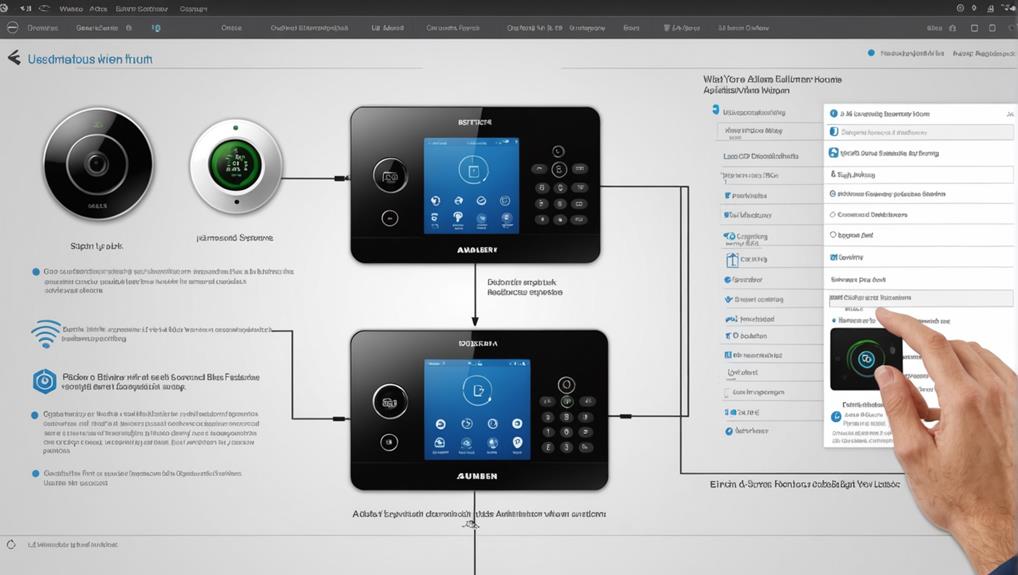
Users play an essential role in the security and reliability of wired and wireless home alarm systems through their active participation in vulnerability reporting and providing feedback.
Wireless systems, in particular, benefit from user engagement due to their installation flexibility and ease of updates.
Here's how you can contribute to the enhancement of alarm systems:
- Report Any Bugs: If you encounter any issues with your alarm system, don't hesitate to report them promptly to the service provider.
- Share Feedback: Your input on the product performance and user experience is valuable in driving continuous improvement efforts.
- Stay Connected: Make sure your contact information is updated for follow-up on reported issues, fostering accountability and trust.
- Emphasize Security: By actively engaging in the vulnerability reporting process, you help manufacturers address security concerns promptly, enhancing the overall product security and user confidence.
Overview and Importance of Security Systems

Having a reliable security system in place is paramount in safeguarding your home and loved ones. With the surge in safety concerns, homes without security systems are three times more likely to experience a burglary.
Visible security measures like alarms and cameras act as effective deterrents, as 60% of burglars check for such systems before attempting a break-in.
Studies have shown that having a residential security system provides essential peace of mind and plays a significant role in crime prevention. Studies have shown that increased installations of security systems lead to a decrease in burglary rates, emphasizing their role in crime prevention.
Both wired and wireless security systems utilize sensors at entry points to alert a central control panel, vital for activating alarms and notifying homeowners or monitoring services.
The choice between wired and wireless systems depends on specific security needs, living situations, and preferences for installation and maintenance.
Operation and Technology of Security Systems
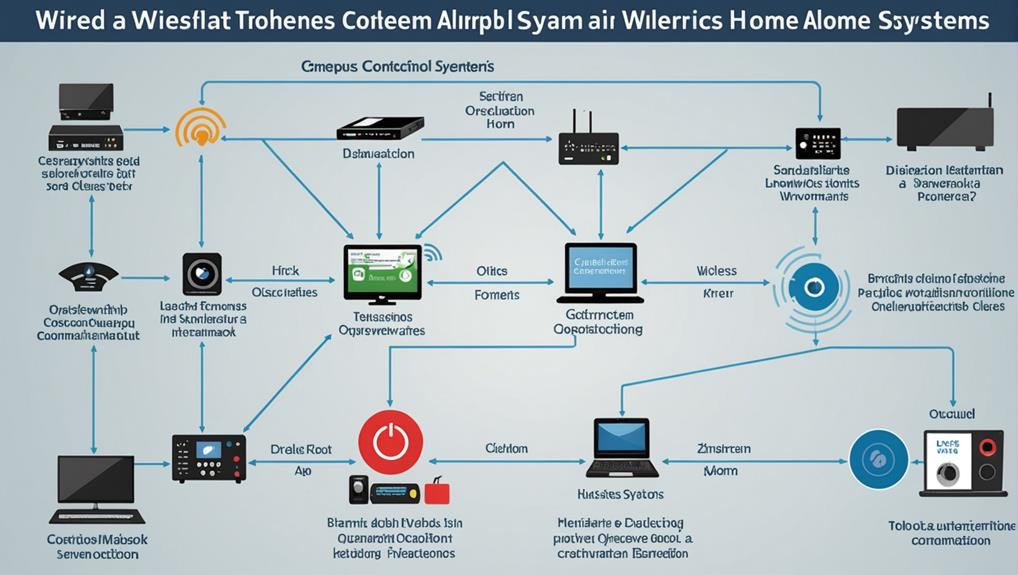
Enhancing the functionality and effectiveness of security systems, both wired and wireless home alarm systems operate by strategically placing sensors at entry points and high-traffic areas to detect unauthorized access.
These sensors can include motion detectors, door and window contacts, and glass break sensors, which all contribute to a thorough security network.
- Wired Systems: Sensors are hardwired to a control panel, utilizing physical connections for communication.
- Wireless Systems: Battery-powered sensors communicate wirelessly with a central hub, eliminating the need for physical wiring.
- Alarm Activation: When a sensor detects a breach, it triggers the central control panel to activate the alarm.
- User Notifications: Notifications are sent to users through phone calls, text messages, or mobile applications to alert them of any security breaches.
While both systems share the same goal of securing your home, wired systems offer enhanced stability and reliability due to their immunity to electromagnetic interference.
This contrasts with wireless systems, which may experience disruptions from household devices.
Understanding these operational differences can help you choose the system that best suits your home security needs.
Benefits and Disadvantages of Wired and Wireless Security Systems
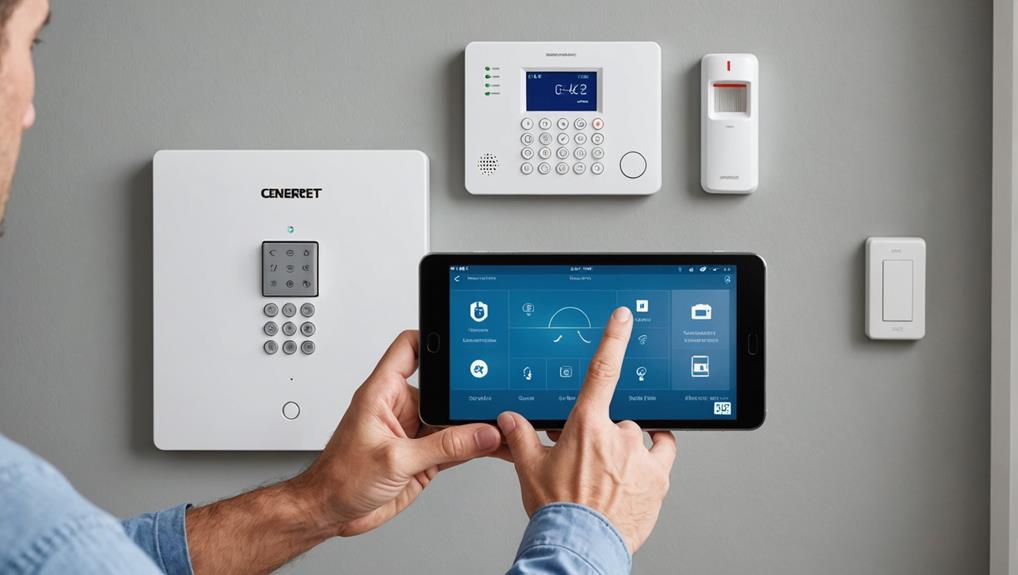
Moving from the operational aspects of wired and wireless home alarm systems, it's essential to evaluate the benefits and disadvantages each type offers.
Wired security systems boast reliable signals and no need for battery maintenance, ensuring fewer interruptions. These systems have an edge regarding long-term use, offering consistent performance over the years. However, they require professional installation, leading to higher upfront costs.
On the other hand, wireless systems provide easy installation and portability, making them ideal for renters. They're immune to power outages but may face signal interference from household devices. While wireless systems offer flexibility in sensor placement and easy upgrades, they could incur ongoing costs for cloud storage.
Wired systems excel in continuous video recording during internet outages, unlike wireless systems that rely on internet connectivity. Additionally, wired systems are less susceptible to hacking and physical tampering.
Consider your priorities and weigh these benefits and disadvantages when choosing between wired and wireless security systems.
Frequently Asked Questions
Is a Wired Alarm System Better Than Wireless?
Yes, a wired alarm system is better than wireless for consistent performance and reliability.
Wired systems offer stable connections unaffected by interference. They don't rely on batteries, reducing the risk of power loss.
With local storage, there are no additional monthly fees. For larger properties, wired systems provide enhanced coverage capabilities.
Opting for wired guarantees uninterrupted security monitoring and eliminates the need for frequent battery replacements or potential connectivity issues.
Which Has Better Security Wired or Wireless?
When it comes to security, you might find that wired systems generally offer better protection compared to wireless ones.
Wired setups tend to be less susceptible to hacking and interference, providing a more stable connection for monitoring. This means they could be a more secure option for keeping your home safe from potential threats.
What Are the Disadvantages of Wireless Alarm System?
When considering a wireless alarm system, it's crucial to recognize some drawbacks.
These systems rely on batteries needing regular maintenance to prevent power loss. Connectivity issues can arise due to household devices or weather, disrupting communication. They're more susceptible to hacking without proper security measures.
Interruptions in Wi-Fi could lead to unmonitored property during outages. Initial costs are higher due to advanced tech, and cloud storage subscriptions might increase long-term expenses.
Are Wired Alarm Systems Obsolete?
No, wired alarm systems aren't obsolete. They offer reliable security without signal interference or susceptibility to hacking.
Professionals recommend them for larger properties for their stable connections and extensive coverage.
With lower long-term costs and no need for expensive cloud storage subscriptions, wired systems remain a solid choice for those valuing stability and security.
Though hybrid systems are gaining popularity, wired systems still hold their own in the market.
Conclusion
To summarize, when it comes to choosing between wired and wireless home alarm systems, it ultimately comes down to your personal preferences and needs. Both options have their own set of advantages and disadvantages, so it's important to weigh them carefully before making a decision. Whether you prioritize connection stability, ease of installation, or network security, make sure to choose the system that best fits your home and lifestyle to guarantee the safety and security of your property.

